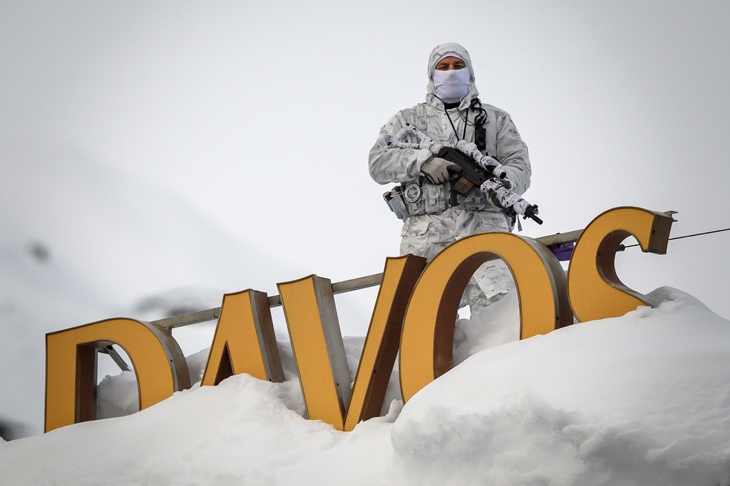Nobody who’s anybody is in Davos this week and, as usual, neither am I. World leaders from Donald Trump to Narendra Modi declined to attend the annual super-elite World Economic Forum in the Swiss Alps, while the UK was represented chiefly by Sir David Attenborough and a giant Union-Flag banner across the front of the Belvedere Hotel proclaiming — incongruously, you might think, given IMF warnings about what a no-deal Brexit might do to global growth — ‘Free trade is great’.
My own excuse was that I’m too busy at home rehearsing the role of a wickedly exploitative landlord in a spoof Victorian melodrama called Her Honour for Tenpence. And that’s apposite, because although no one bothers with the actual Davos agenda (a load of blah about ‘Globalisation 4.0’), the meeting has provided another peg for Oxfam, the aid charity turned hard-left provocateur, to steal headlines by publishing a chilling attack on the sins of the global rich.
This year’s bulletin offers the eye-catching factoid that while the poorest half of humanity got poorer last year, the world’s 2,208 billionaires got collectively richer by $2.5 billion a day. Closer to home, it claims (on the basis of ONS data) that the poorest 10 per cent in the UK ‘are now paying a higher proportion of their incomes in tax than the richest 10 per cent’ — after taking account of VAT and other indirect levies. Oxfam’s solution to these rising inequalities is a Piketty-style global wealth tax which if charged at 0.5 per cent on the planet’s richest percentile would fund education and healthcare on a vast scale.
Now, unless you’re a Trotskyite browsing The Spectator by mistake in the dentist’s waiting room, you’ll be wondering why I’m giving Oxfam’s agitprop the oxygen of publicity. The point is this: the British ruling elite is so obsessed with Brexit that nothing is being done to address the grievances which might deliver a Labour government — whose wealth taxes, you may be sure, will be a lot higher than 0.5 per cent and whose impact on prosperity in its wider sense will be catastrophic. The imperative for finding a path out of current parliamentary chaos — given that all the possible long-term Brexit outcomes are no better than guesswork and wishful thinking — is surely to keep John McDonnell and Jeremy Corbyn out of Downing Street.
The backlash intensifies
As a footnote, let us glance at another annual report published for Davos: PwC’s survey of sentiment among the world’s chief executives found ‘a sixfold rise in gloom’, as one headline put it, with 30 per cent expecting global growth to slow this year. Pessimism is strongest among American bosses, as the impact of Trump’s tax cuts fades and trade tensions rise. But what’s pretty sure — Oxfam would swiftly remind us — is that PwC’s respondent group won’t personally get poorer this year: FTSE100 chiefs’ pay was last measured rising at 11 per cent per annum. If economic performance falls as income differentials continue to increase, the backlash against global elites will only intensify. By this time next year, Davos may be the safest place to hide.
Patisserie mystery
Patisserie Valerie, the cake-shop chain that found a potentially fraudulent £40 million black hole in its finances last October, fell into administration on Tuesday after failing to persuade its bankers not to pull the plug. Chairman Luke Johnson, having lent the company £10 million plus last-minute cash to help pay this month’s wages for 3,000 staff, joins the creditors’ queue. Investors who put £15 million into his attempted rescue late last year are disgruntled, while investigations into the role of auditors Grant Thornton and former finance director Chris Marsh have yet to throw light on what went wrong in the first place.
What’s curious about this mystery story is that it could not have happened to a more genteel brand. One reader tells me that he thought Patisserie Valerie’s shares an ideal home for his student daughter’s savings at £3.30 in late 2017 and was cross when she cashed out (‘and partied’) above £4 in May 2018. Suspended at £4.29, they are now worthless. Sensible girl.
Piles and stockpiles
‘When I get older, losing my hair,’ sang The Beatles in ‘When I’m Sixty-Four’. I passed that milestone this week and my hair is the only thing I’m losing so far, but like most of my cohort I’m a regular consumer of prescription drugs intended to defer other forms of falling apart. So my eye was caught by news that common medications could run short, not because ministers have failed to fill warehouses as part of Brexit contingency planning, but because of panic buying further down the chain. I won’t share my medical record, but I can tell you that the leaflet for one of my daily tablets says it is made in Hampshire and that the other comes from a Bavarian firm which lists six factories in EU locations as far afield as Slovenia and Romania, but only one in the UK. At those odds, I’ll certainly be a hoarder if I can find a black-market seller; meanwhile, I advise you to nip upstairs and check the small print in your pill packets.
And here’s a sidelight on this issue that may well be a world exclusive, because no other journalist has dared write about it. A reliable source tells me that in the second half of 2016 there was a near-total absence of haemorrhoid suppositories from British chemists for several weeks. Whether the referendum result provoked a spike in psychosomatic demand I leave to your imagination, but research reveals that the best-known brand of this soothing product is manufactured at Angers in the Loire valley. So beware: if French customs officers are furious with us for crashing out with no deal, they need only impound a couple of container-loads to impose a peculiarly uncomfortable form of national revenge.







Comments